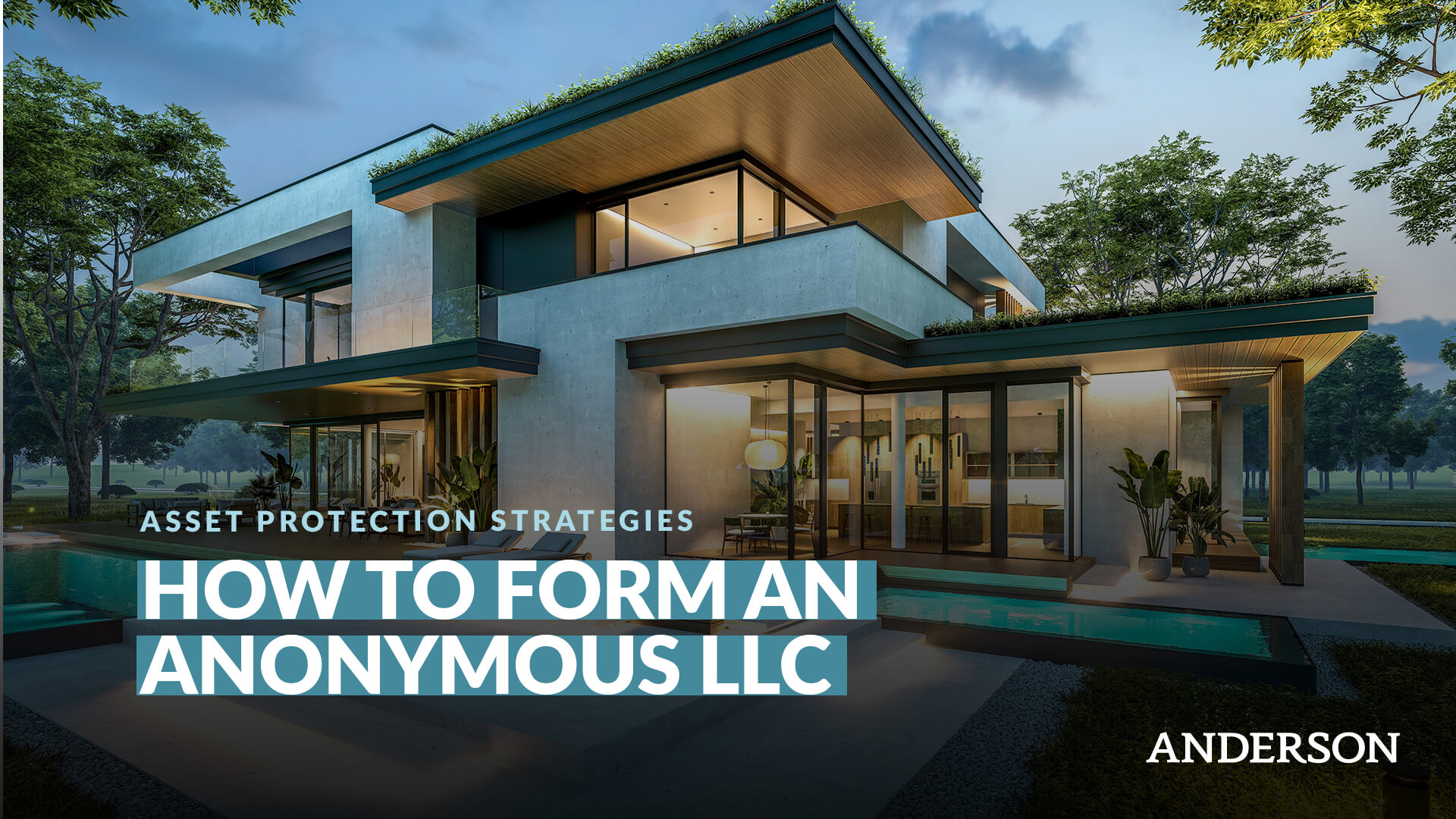
When it comes to real estate investing, privacy is power. If your name is plastered across public records, you’re making yourself an easy target for lawsuits and unwanted attention. That’s why savvy investors use an Anonymous LLC for real estate asset protection.
In this guide, I’ll address the most common questions I hear from clients about anonymous LLCs—how they work, why they matter, and the exact steps you can take to set one up correctly.
Want the full breakdown? Watch my YouTube video here.
What Exactly Is an Anonymous LLC?
An Anonymous LLC is just like a regular limited liability company (LLC), except your personal name doesn’t appear in public filings. Typically, when you form an LLC, your name as the owner or manager ends up searchable in the Secretary of State’s database. That’s basically an invitation for predators, litigators, or even nosy neighbors to target you.
With an anonymous LLC, you file in such a way that your ownership is shielded. The LLC exists as a separate legal entity, but your identity stays private. It’s perfectly legal, widely used, and one of the best strategies for real estate investors.
Why Would a Real Estate Investor Want an Anonymous LLC?
The number one reason is setting up an LLC for asset protection through privacy. When people see your name tied to multiple rental properties, you’re like a walking bullseye for lawsuits.
Think about it:
- If a tenant, contractor, or attorney looks you up and sees you own 10 properties, they know you’ve got deep pockets.
- If your name is hidden, they don’t know what you own or whether it’s even worth pursuing you.
This is why anonymity is so powerful. You can’t be a target if people don’t know what you own.
Other benefits include:
- Protecting your personal assets from frivolous lawsuits
- Shielding your family’s privacy
- Separating your investments from personal business operations
- Keeping your portfolio under the radar
Unlock the Secrets of Top Real Estate Investors — Save Your Free Spot Today!
Join our FREE Virtual Tax & Asset Protection Workshop to discover how to slash your taxes, shield your assets, and secure your financial future.
Live Q&A with Experts | Real Strategies You Can Use Immediately
How Does an Anonymous LLC Compare to Other Business Entities Like Sole Proprietorships or Corporations?
This is one of the most common questions I get. Many new investors think they can just operate as sole proprietorships because it’s “simple.” But here’s the truth:
- Sole proprietorships offer zero liability protection. If something goes wrong, your personal assets are fair game.
- Corporations provide liability protection, but they often come with stricter compliance rules and aren’t always the best fit.
- LLC formation, especially for real estate, is usually the sweet spot. An LLC offers flexibility, legal protection, and, when structured correctly, anonymity.
In short, if you’re serious about protecting your personal assets, you need an entity structure that separates your business operations from your personal life. Learn more about the advantages of each entity here.
What States Allow Anonymous LLCs?
Not every state gives you true anonymity. The best states for anonymous LLCs are:
- Wyoming
- Nevada
- Delaware
These states don’t require the owners’ names to be publicly listed. When you file in Wyoming, Nevada, or Delaware, your name never appears on the public record.
You might be thinking: “But Clint, my rental property is in Texas (or Florida, or Ohio)… how does that work?”
That’s where structuring comes in. You can use a Wyoming or Nevada anonymous LLC as the holding company, and then that entity owns your local LLC where the property is located. You still get the local compliance benefits while keeping your personal identity hidden.
What Are the Tax Advantages of Forming an Anonymous LLC?
Here’s where things get even better. Anonymous LLCs don’t just give you privacy — they also provide tax benefits.
- By default, a single-member LLC is treated like a disregarded entity for tax purposes. That means income flows through to your personal tax return without double taxation.
- If you have multiple members, the LLC is treated like a partnership, giving you additional flexibility.
- You can elect S-Corp taxation in certain cases to reduce self-employment taxes.
In short, the LLC offers flexibility for tax purposes, helping you manage tax liabilities while still protecting your assets. Compare that to a sole proprietorship—no protection and limited tax advantages—and it’s clear why investors choose LLCs.
What Role Does Liability Insurance Play Alongside an Anonymous LLC?
Some investors assume liability insurance alone is enough. But here’s the deal:
- Insurance companies are in the business of collecting premiums, not paying claims.
- Policies often have exclusions and caps. If a claim exceeds the policy’s coverage, your personal assets are at risk.
An Anonymous LLC plus liability insurance is the winning combo. The LLC shields your wealth, and insurance handles the smaller day-to-day risks. Together, they create a strong asset protection strategy.
How Do You Actually Form an Anonymous LLC?
Here’s the step-by-step process:
- Choose your filing state.
Pick Wyoming, Nevada, or Delaware for true anonymity. - Use a nominee or registered agent.
This ensures that your name isn’t on the public filing. Instead, the registered agent’s information appears. - Set up an operating agreement.
Even if your name isn’t on the public record, you need an internal document that establishes ownership. That’s how you prove your rights legally without broadcasting them. - Layer your structure for protection.
Often, I’ll set up a two-tier structure:
- Anonymous LLC at the top (in Wyoming/Nevada)
- A separate LLC for each rental property underneath (in the state where the property is located)
- Anonymous LLC at the top (in Wyoming/Nevada)
This makes each property a separate entity, so a lawsuit in one can’t reach the others.
Bonus Tip: Even the name you choose can protect your privacy. Avoid using your last name, street name, or anything that ties directly back to you. The goal is to make your LLC look like a separate entity that can’t easily be traced. For more guidance, check out my full article about naming your LLC.
To make this easy, I created a step-by-step Anonymous LLC Checklist you can download for free.
Is This Some Kind of Loophole?
Lawyers have been setting up LLC formations like this for decades. These laws exist because certain states want to attract business filings, so they make privacy a feature.
You still report income, you still pay your taxes, and you still operate legitimately. This is about protecting your personal assets and keeping business separate from personal life.
Can Courts Pierce the Corporate Veil With Anonymous LLCs?
This is an important point. A court can “pierce the corporate veil” if you don’t treat your LLC as a separate legal entity.
That means the protection may not hold if you mix personal and business funds, skip annual filings, or ignore compliance rules.
But if you follow the rules—separate bank accounts, proper contracts, and clean bookkeeping—your LLC’s protection will be strong.
How Does This Affect Interest Rates and Financing?
Some investors worry that anonymity will hurt their ability to get loans. In reality, lenders still care about the business operations and the person guaranteeing the loan.
- You may still need to personally guarantee certain loans, especially early on.
- Over time, once your entity establishes credit, you can often borrow directly under the LLC.
- While interest rates may vary depending on whether you’re borrowing personally or through an entity, the protection and tax advantages often outweigh minor rate differences.
What’s the Best Entity for Real Estate Investments Overall?
That depends on your goals. For most of my clients:
- Anonymous LLCs work best for privacy and lawsuit protection.
- Series LLCs can be great if you own multiple properties in one state.
- Corporations are better for active businesses.
The answer depends on what you own, where you own it, and how much risk you want to shield.
Where Should I Start If I Want to Form an Anonymous LLC Today?
Start by getting clear on your structure and your goals. Then, follow a step-by-step checklist so nothing gets missed.
Here’s your next move: Download the Anonymous LLC Checklist.
It lays out every step, from choosing your state to structuring your operating agreement. Whether you’re protecting one rental or a whole portfolio, this checklist will save you from costly mistakes.
And if you’d rather have a professional set it up for you, schedule a free 45-minute Strategy Session with one of our senior advisors at Anderson Advisors. We’ve been doing this since 1999, and we know how to structure your investments to protect your wealth.
Final Thoughts
Forming an Anonymous LLC is one of the smartest moves you can make as a real estate investor. It gives you the same legal protection as a regular LLC—plus the added advantage of privacy.
The bottom line is this: if your name isn’t on the public record, you’re harder to sue. And that’s exactly the kind of protection you want when building long-term wealth in real estate.














